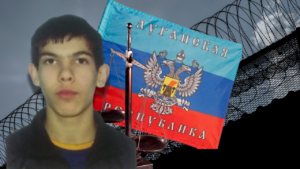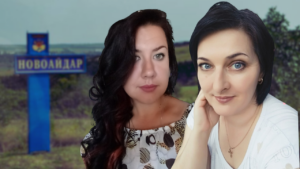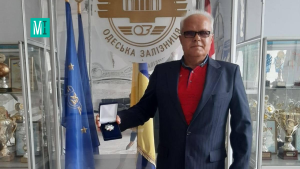No defense guaranteed in case of detention: the way so-called attorneys work in the occupied territories

Since 2014, thousands of inhabitants of the occupied territories have been imprisoned on such charges as “involvement in terrorist activities” and “espionage”. The real reason is their pro-Ukrainian position. The majority were “sentenced” to long terms of imprisonment, while they were not provided with the right to defense – lawyers were either not allowed or appointed from the selected cohort. Dozens of former hostages named several of them after the release. They did not speak of them as defenders but as prosecutors.
Rude detention, “interrogation” with torture, “searches”, and robbery are the algorithm Russian-controlled armed formations in Donetsk use when it comes to accusations of espionage or pro-Ukrainian activities of civilians. Usually, during all stages of this algorithm, neither detainees nor their relatives know the names, surnames, or positions of those who detain them. They do not inform relatives about the person’s place of detention but always recommend them to look for a lawyer.
In fact, in Donetsk or other occupied cities of Ukraine, very few so-called lawyers are allowed to provide “legal aid” in this category of cases. The number of the ones allowed to participate in political processes is even smaller. All of them used to be Ukrainian lawyers, have the relevant certificates issued before 2014, and after the occupation, they decided to cooperate with representatives of the Russian-led occupation administrations, turning into accomplices of crimes in quasi-state entities. According to the testimony of detainees and their relatives, there is no respect for the principles of the rule of law, legality, independence, confidentiality, there’s no lawyer ethics rules in the occupied territories. The right to protection is exercised only on paper.
Thus, detainee Oleksandr U.’s wife (the name changed for security reasons, they detained the man in the summer of 2019) received a piece of advice from a local lawyer, one of the few cooperating with the so-called Ministry of State Security of the DPR. The family had to pay a thousand dollars for the provision of legal services immediately. However, according to the woman, the lawyer did not take any actions regarding the legal protection of her husband and provided no legal assistance.
“The lawyer immediately told me, with such criminal law articles, which your husband is facing, no one releases, they only send them for exchange,” the woman recalls.
The only valuable information the relatives received from the “defender” was Oleksandr’s whereabouts. He confirmed that during the first months, Oleksandr was held in Donetsk on the territory of the Izolyatsia prison, a former insulation factory. Relatives are sure that he was tortured there. In the fall of 2019, Oleksandr was transferred to the so-called MSS Pre-trial detention center on the territory of Penal colony No. 97, where they keep him to this day.
It should be reminded that one of the rights of a detainee is to see a lawyer alone. However, Oleksandr, a “protege”, didn’t have any meeting with the lawyer at all, not to mention in private. Instead, this pseudo-defender communicated with his relatives and offered them to add Oleksandr’s name to lists for exchange. Such a “service” wasn’t free. “You will learn the exact amount only when you give me a positive answer,” said the “defender”.
However, the family understood that this was a shakedown. After they refused, the lawyer stopped answering phone calls and contacting them.
The activity of the so-called lawyer is just an example of how the “justice system” works in the occupation. No one interrogates witnesses there, they can show case materials only partially, and they convict people during one session without considering the case.
Managing partner of the Umbrella attorneys at law and MIHR expert Andrii Yakovliev says that the way they treat Oleksandr and other civilians detained in the occupied territories for pro-Ukrainian activities violates the laws and customs of war, in particular, the Convention relative to the Protection of the Civilian Persons in Time of War. This international instrument prohibits conviction and punishment without a prior judicial decision by an independent and impartial tribunal, duly constituted and providing universally recognized judicial guarantees.

Andrii Yakovliev. Photo MIHR
According to the minimum guarantees, the accused must have the right to present the evidence necessary for his defense, in particular, to call witnesses to the court, with the help of a qualified human rights defender of his choice, who must be able to visit the accused freely and must be provided with all the necessary means to prepare the defense.
Other gross violations of the laws and customs of war include torture or inhuman treatment intentionally causing great suffering or serious injury to body or health, illegal imprisonment, or the intentional deprivation of rights to a person protected by the laws and customs of war, a fair and formal trial.
The stated circumstances indicate that Oleksandr was detained and imprisoned illegally, and they haven’t been providing him with the right to have a fair trial since 2019, which constitutes a gross violation of the laws and customs of war, which international practice qualifies as a war crime (Article 8 (2) (a) (ii) (vi) ICC Statute).
It is essential to add that as Russia exercises absolute military control over the occupied part of the Donetsk region and, in particular, the city of Donetsk, the war crime stipulated by the Rome Statute was committed by the Russian Federation.
***
The project “The quasi legal system in the occupied Donbas: combating impunity by legal and advocacy tools” is implemented by the Media Initiative for Human Rights with the financial support of the Embassy of the Kingdom of the Netherlands in Kyiv.







